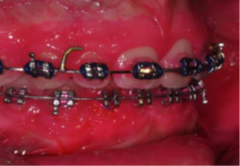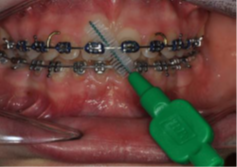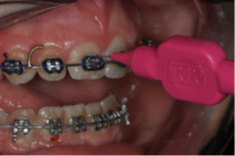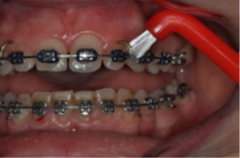Your Visit to the Dental Hygienist
This leaflet has been written for patients who have been referred to see our dental hygienist.
What is a dental hygienist?
A dental hygienist will help you clean your teeth and gums to try to keep your mouth healthy. This is really important whilst you are wearing braces.
Why do I need to visit the dental hygienist?
Your orthodontist may feel that you need advice and help with cleaning.
Some people have a build-up of tartar (calculus) on their teeth. This is a hard build-up of plaque which is difficult to remove. The dental hygienist can remove this for you.
Why is it important that I see the dental hygienist?
Poor cleaning can lead to:
- bad breath
- stained teeth
- tooth decay
- gum disease
- losing teeth.
Braces make it more difficult to clean, therefore you are at more risk of having these problems during brace treatment.
If you do not clean well, and the risk of your teeth becoming damaged is too great, your orthodontist may have to take off your brace even if your teeth are not fully straight.
What will the dental hygienist do?
Our dental hygienist will thoroughly clean your teeth (a scale and polish). This will remove plaque and hard deposits of tartar that build up on teeth. This usually takes around 10-15 minutes.
More importantly they will teach you how to stop plaque and tartar coming back. They will show you:
- Good tooth brushing technique
- How to clean the areas you are missing
- How to clean around your brace
- How to clean between your teeth.
They can advise you on:
- The best toothbrush for you
- Extra brushes or dental tape to help clean difficult to reach areas
- The best toothpaste for you
- The best mouthwash for you.
They may give you advice about your diet eg reducing how often you have sugary or acidic foods and drinks.
Some people need protection of fluoride varnish. They will apply this if needed.
What other help can be given to adults?
Gum disease
Adults before having braces, may have had gum disease. Our hygienist will help make sure that your gum disease is controlled. As well as help with cleaning, she can also use anti-bacterial gels and solutions applied under the gum to kill the bacteria causing gum disease.
Smoking
If you smoke, she will discuss:
- The impact of this on your oral health
- How to increase your chances of success in stopping smoking.
As well as staining of the teeth, smokers have more gum disease and lose more teeth than non-smokers.
How can I keep my mouth healthy?
- Brace wearers should clean their teeth every time they eat. Brushing around fixed braces can take four minutes or longer. Make sure you leave yourself with enough time to do a good job
- If you do not have a brace, you should clean at least twice a day. Brush for at least three minutes
- Use a toothpaste containing fluoride
- Do not rinse your mouth after brushing; just spit out excess toothpaste
- Use dental tape or special brushes to clean between your teeth
- Use a fluoride mouthwash daily (at a different time of day to brushing)
- Cut down on the snacks you have between meals
- Limit sugary treats to meal times
- Avoid sugary and acidic drinks. If you have one as a treat, use a straw
- Avoid chewy and hard sweets
- Do not add sugar to tea and coffee
- Apps like ‘Sugar Smart’ can help you to identify foods containing high levels of sugar.
Tips and hints on cleaning
- Use a re-chargeable electric (not battery powered) toothbrush, with a small round head
- Alternatively, use a small headed, adult size, good quality toothbrush with medium bristles
- Try to brush in the same order every time – outside, inside and biting surfaces, then use special brushes to clean around the braces and under the wire (see below)
- Do not scrub at your gums, but make sure you do clean under your gums and not just your teeth
- Brush your tongue to remove bacteria and keep breath fresh.

Disclosing tablets contain a dye, which sticks to dental
plaque and shows the areas you need to clean.

Interdental brushes such as TePe® brushes can help to
clean under the wire (size green or blue)

Interdental brushes can also be used to clean between the
teeth (size pink or orange).

An interspace brush will help you clean around the brace.
Contact numbers
We hope you have found this information useful, but if you have any questions or are worried about anything, please speak to the orthodontic team:
Orthodontic Department (Dorset County Hospital): 01305 2551747
Orthodontic Department (University Hospitals Dorset): 0300 019 4694
About this leaflet
Author: Pamela Ellis, Consultant Orthodontist
Written: March 2021
Approved: April 2021
Review date: March 2025
Edition: v2
If you have feedback regarding the accuracy of the information contained in this leaflet, or if you would like a list of references used to develop this leaflet, please email patientinformation.leaflets@dchft.nhs.uk
Print leaflet